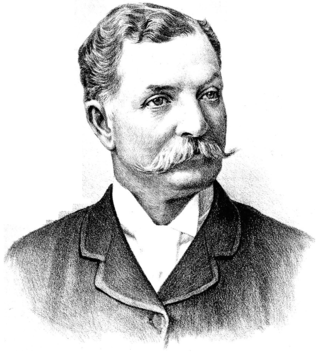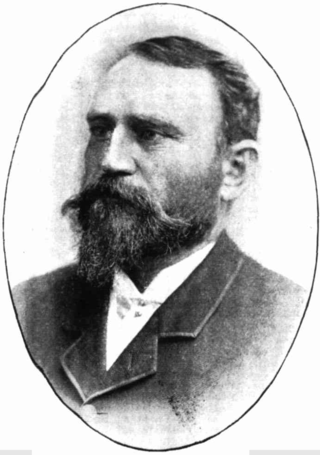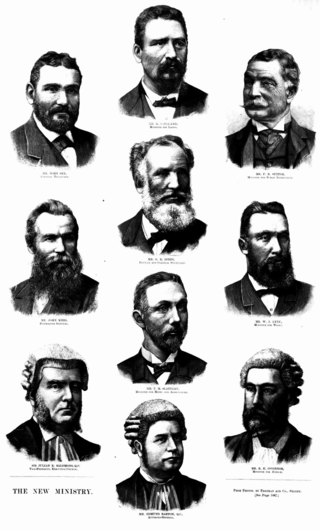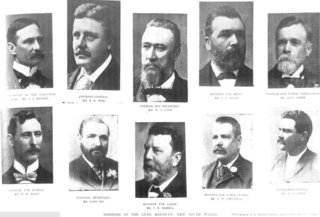Related Research Articles

Sir George Richard Dibbs KCMG was an Australian politician who was Premier of New South Wales on three occasions.

Sir Francis Bathurst Suttor was an Australian pastoralist, politician, and sheep and horse breeder.

John Henry "Jack" Want was an Australian barrister and politician, as well as the 19th Attorney-General of New South Wales.
Members of the New South Wales Legislative Assembly who served in the 12th parliament of New South Wales held their seats between from 1885 to 1887. Elections for the twelfth Legislative Assembly were held between 16 and 31 October 1885 with parliament first meeting on 17 November 1985. The Assembly was expanded from 113 to 122 members elected in 37 single member electorates, 24 two member electorates, 7 three member electorate and 4 four member electorates. The parliament had a maximum term of 3 years but was dissolved on 26 January 1886 after 14 months. The Premiers during this parliament were George Dibbs until 22 December 1885, Sir John Robertson until 26 February 1886, Sir Patrick Jennings until 20 January 1887 and Sir Henry Parkes.

James Henry Young was an Australian colonial businessman and politician and Speaker of the New South Wales Legislative Assembly.

The fifth Parkes ministry was the 26th ministry of the Colony of New South Wales, and was led by the seventh Premier, Sir Henry Parkes. It was the fifth and final occasion that Parkes was Premier. The title of Premier was widely used to refer to the Leader of Government, but was not a formal position in the government until 1920. Instead the Premier was appointed to another portfolio, usually Colonial Secretary. Having served in the New South Wales Legislative Council between 1854 and 1856, Parkes was elected in the first free elections for the New South Wales Legislative Assembly held in 1856, however resigned from Parliament later that year. He served in the Assembly on several occasions, between 1858 and 1870, being forced to resign on 4 occasions due to his personal insolvency. He came to power as Premier on the first occasion in 1872, serving as Premier for a period of three years. However, Parkes lost the confidence of the Assembly following Governor Robinson's decision to release of the bushranger Frank Gardiner led to the defeat of the ministry in 1875.

The third Dibbs ministry, the 27th ministry of the Colony of New South Wales, was led by Sir George Dibbs, leader of the Protectionist Party, following the 1891 New South Wales election, which saw the Labour Party win seats in the New South Wales Legislative Assembly and the balance of power. With no party having a majority, Sir Henry Parkes held on as Premier until October 1891 when he lost a vote in the Legislative Assembly, causing Parkes to resign as Premier and leader of the Free Trade Party. Dibbs formed the ministry on 23 October 1891, with Labour support, and comprised 10 ministers.

The Lyne ministry was the 29th ministry of the Colony of New South Wales, and was led by the 13th Premier, Sir William Lyne, KCMG.

John Daniel FitzGerald was a politician, union official, journalist and barrister in New South Wales, Australia.

Charles Gilbert Heydon was an Australian politician and judge.
A by-election was held for the New South Wales Legislative Assembly electorate of Newtown on 13 January 1883. The election was triggered by the appointment of Henry Copeland as Secretary for Public Works in the Stuart ministry.
Bourke, an electoral district of the Legislative Assembly in the Australian state of New South Wales was created in 1880 and abolished in 1904.
East Sydney, an electoral district of the Legislative Assembly in the Australian state of New South Wales was created in 1859 and abolished in 1894.
A by-election was held for the New South Wales Legislative Assembly electorate of East Sydney on 17 February 1865 because Charles Cowper had been appointed Premier and Colonial Secretary, forming the fourth Cowper ministry. Such ministerial by-elections were usually uncontested however on this occasion a poll was required in East Sydney, The Glebe and West Sydney. Each minister was comfortably re-elected. Only The Paterson was uncontested.
A by-election was held for the New South Wales Legislative Assembly electorate of The Glebe on 17 February 1865 because Thomas Smart had been appointed Colonial Treasurer in the fourth Cowper ministry. Such ministerial by-elections were usually uncontested however on this occasion a poll was required in East Sydney, The Glebe and West Sydney. Each minister was comfortably re-elected. Only The Paterson was uncontested.
A by-election was held for the New South Wales Legislative Assembly electorate of West Sydney on 18 February 1865 because John Darvall had been appointed Attorney General, and John Robertson had been appointed Secretary for Lands in the fourth Cowper ministry. Such ministerial by-elections were usually uncontested however on this occasion a poll was required in East Sydney, The Glebe and West Sydney. Each minister was comfortably re-elected. Only The Paterson was uncontested.
A by-election was held for the New South Wales Legislative Assembly electorate of East Sydney on 11 January 1883 because George Reid was appointed Minister of Public Instruction in the Stuart ministry. Such ministerial by-elections were usually uncontested and six ministers were re-elected unopposed. On this occasion a poll was required in East Sydney and Newtown. Copeland was defeated but regained a seat in parliament at the second by-election for East Sydney held on 23 January 1883. The six other ministers, Alexander Stuart (Illawarra), George Dibbs, Henry Cohen, James Farnell, Francis Wright (Redfern) and Joseph Abbott (Gunnedah), were re-elected unopposed.
A by-election was held for the New South Wales Legislative Assembly electorate of University of Sydney on 15 July 1879 because William Windeyer resigned to accept a temporary appointment as a judge of the Supreme Court.
A by-election was held for the New South Wales Legislative Assembly electorate of West Sydney on 15 July 1877 because Sir John Robertson was appointed Colonial Secretary, forming the fourth Robertson ministry. Such ministerial by-elections were usually uncontested however on this occasion a poll was required in Central Cumberland, East Sydney, Orange and West Sydney. Each minister was comfortably re-elected. Only Camden and Goldfields South were uncontested.
A by-election was held for the New South Wales Legislative Assembly electorate of South Sydney on 13 February 1893 because of the resignation of James Toohey (Protectionist), in protest at the failure of the Protectionist Dibbs government to implement principles of protection.
References
- ↑ "Sir Edmund Barton GCMG (1849–1920)". Former members of the Parliament of New South Wales . Retrieved 16 April 2019.
- ↑ Green, Antony. "1881 to 1893 by-elections". New South Wales Election Results 1856-2007. Parliament of New South Wales . Retrieved 10 September 2020.
- ↑ "Appointment of ministers". New South Wales Government Gazette . No. 673. New South Wales, Australia. 23 October 1891. p. 8359. Retrieved 10 September 2020– via Trove.
- ↑ "Writ of election: East Sydney". New South Wales Government Gazette . No. 680. 27 October 1891. p. 8439. Retrieved 10 September 2020– via Trove.
- ↑ Green, Antony. "November 1891 East Sydney by-election". New South Wales Election Results 1856-2007. Parliament of New South Wales . Retrieved 10 September 2020.